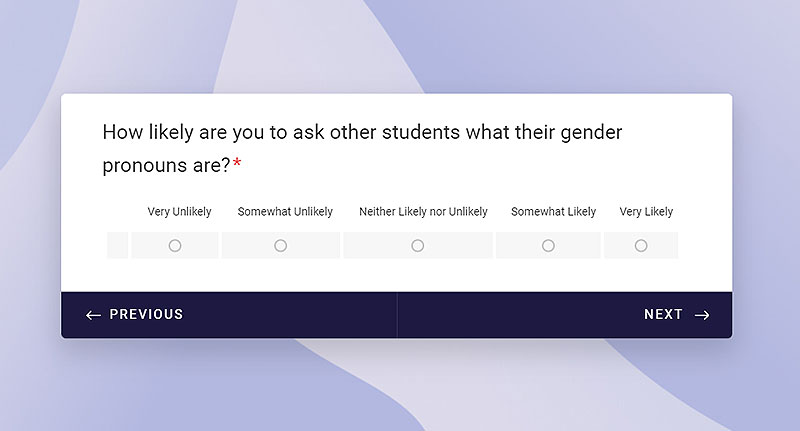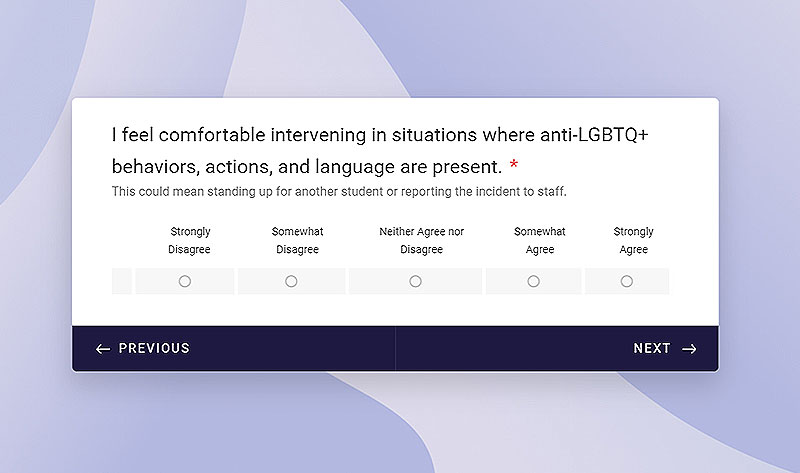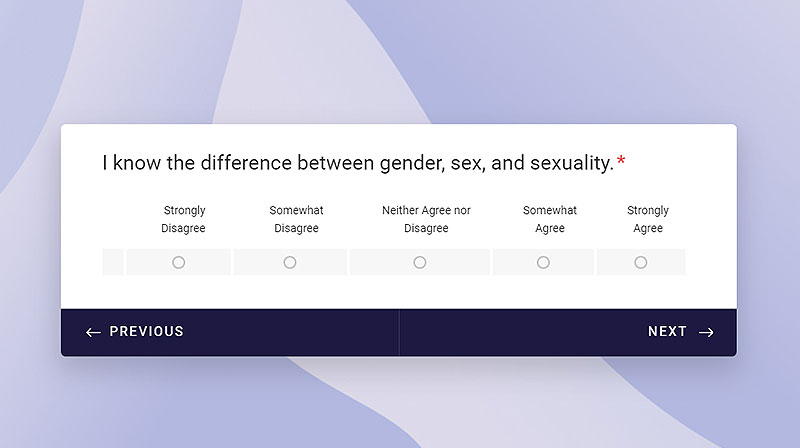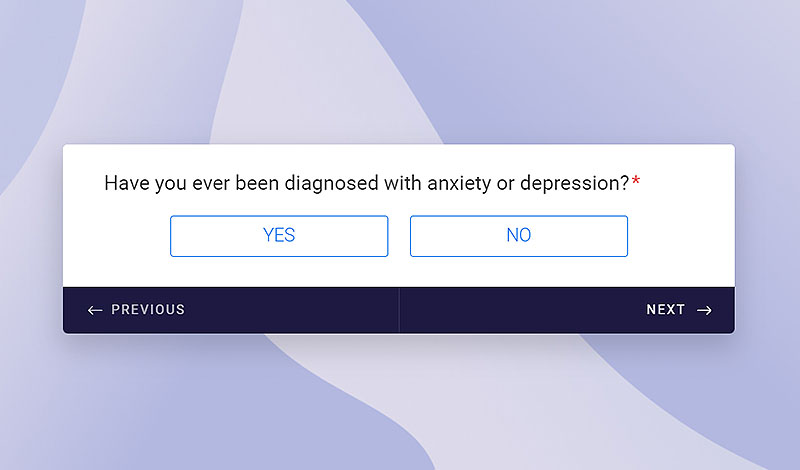Behind the Scenes:
LGBT “student survey” shows how middle schools traumatize children, resulting in emotional problems and destructive behaviors
Indoctrination in radical transgender ideology
Making homosexuality, transgenderism, drug use, and depression seem normal in children’s minds
Poisoning a young generation with toxic ideas – as parents are kept in the dark
June 22, 2022
 Middle school children should never have any of these topics pushed at them.
Middle school children should never have any of these topics pushed at them.Part of our series on insider material forwarded to us by teachers, parents, and activists from across the country. Here’s what’s going on behind the scenes in your schools.
Schools have become dangerous places to send your young children. Parents are unfortunately kept in the dark about what is happening.
Middle school children are typically 11-13 years old. Most adults will remember that as a time when they were “just being kids.” But now, a large percentage of middle school children are declaring themselves “transgender” or “gay,” falling into depression or drug use, engaging in early sexual activity or other destructive behaviors.
Why is this happening? A big reason is that schools are covertly (from the public’s standpoint) pushing very radical and toxic ideas.
The middle school “student survey” documented below provides a window on how schools are subverting children.
 Screenshot from the online survey given to children at Massachusetts middle schools
Screenshot from the online survey given to children at Massachusetts middle schoolsThe middle school student survey
Last month, a middle school teacher in Saugus, Massachusetts shared with MassResistance two disturbing surveys that were given at her school and another middle school nearby (and likely others). One survey was given to teachers, which we recently reported on. The other survey was for the children and appears below.
Both surveys were written by the Everett LGBTQ+ Youth Space and Resource Center (ELYSRC), a slick “local” LGBT organization which clearly appears to be organized and funded by outside forces.
This “student survey” is not the work of amateurs. The questions are professionally crafted to alter a child’s view of reality. The survey clearly reveals how the school had already been prompting students to think, act, and feel (or there would be no basis for these questions). “Facts” and attitudes that are actually lies, distortions, and outright medical quackery are presented as unquestionably true. Perverted behaviors and feelings are cast as completely normal for a middle school child to engage in. The survey will make the student feel unusual if he does not go along with the attitudes presented.
The online survey (which was accessible for a brief time) was divided into three sections and is copied below. The required questions are followed by an asterisk.
“Are you part of the LGTBQ+ community?”
The survey started by asking the children a (required) question: "Are you a part of the LGTBQ+ community?*” (Note the reversal of letters TB in the acronym; we’re not sure what that means. Possibly just a typo.) It then asked them:
How do you identify? (ex. Lesbian, Non-binary, Queer, etc.) This question is optional but will help create better data. Please list all that apply.
This immediately makes kids feel that those terms and “identities” are a normal part of society, and if they are not a part of that “community” they may be out of step, or not “cool.”
The survey questions
Section 1 tests how much the child has internalized the radical transgender ideology and is willing to enforce it in school. In the past, no middle school child would have any idea what any of this bizarre language meant, much less believe the concepts. It is unbelievable that schools are forcing on students these lunatic new concepts and words: LGBTQ+ identity, gender, gender-neutral, preferred pronoun, neopronoun, preferred name, dead name, etc.
Note that the questions become progressively more intense. Note also that the last three questions veer off into drug use, emotional trauma, and destructive choices.
SECTION 1
In this section, you will rate the likelihood of the following statements. (10 Questions)
Pick from: Very Unlikely, Somewhat Unlikely, Neither Likely nor Unlikely, Somewhat Likely, Very Likely
- How likely are you to befriend someone who has an LGBTQ+ identity?*
- How likely are you to use gender-neutral pronouns when referring to someone you do not know (or whose gender pronouns you do not know)?*
- How likely are you to share your gender pronouns without being asked?*
- How likely are you to ask other students what their gender pronouns are?*
- How likely are you to remember another student's preferred name(s)?* This field is required.
(A preferred name is a name that may differ from a name given to someone at birth/by their guardians.) - How likely are you to correct another student if they use an incorrect name or gender pronoun to refer to someone else?*
- How likely are you to intervene in situations where anti-LGBTQ+ behaviors, actions, and language are present? *
(This could mean standing up for another student or reporting the incident to staff.) - How likely are you to use non-prescription substances to cope with your emotions and experiences?*
("Non-prescription substances" refers to any drugs that your doctor has not prescribed to you.) - How likely are you to skip school?*
- How likely are you to avoid medical treatment?*
 A screenshot from the survey.
A screenshot from the survey.Section 2 seems be designed to psychologically reinforce the messages in Section 1, with more questions about transgender ideology and how the child acts on it with fellow students. As in Section 1, the questions become increasingly intense.
Note near the end are questions whether the family’s religious beliefs are detrimental – i.e., “make it difficult for me to support LGBTQ+ people.” There is also an odd question about dress code violations, which are probably lax to start with. (This may be intended to ally a “straight” student who dislikes dress codes with transgender students’ challenges to dress codes and appearance standards.)
SECTION 2
In this section, you will determine the level to which you agree or disagree with the following statements. (24 Questions)
Pick from: Strongly Disagree, Somewhat Disagree, Neither Agree nor Disagree, Somewhat Agree, Strongly Agree
- I know the difference between gender, sex, and sexuality.*
- I know what gender pronouns are.*
- I am familiar with different types of gender pronouns. *
(Like neopronouns and gender-neutral pronouns.) - I feel comfortable asking for others’ pronouns.*
- I feel comfortable switching back and forth between different gender pronouns to refer to someone that has more than one.*
- I know what “dead names” are.*
- I feel comfortable asking other students about their preferred name(s).*
- I feel comfortable using other students' preferred names.*
- It is difficult for me to remember someone's gender pronouns or preferred name(s). *
- It is necessary to use the preferred name(s) and gender pronouns that a person tells me to use when referring to them.*
- I know how to correct myself and others if an incorrect name or gender pronoun is used to refer to someone.*
- A person’s name and pronouns could change at any time.*
- I can tell what a person’s gender or gender pronouns are based on their appearance.*
- I learn about LGBTQ+ history, people, or social issues in one or more of my classes.*
- I know what behaviors, actions, and language would be considered anti-LGBTQ+.*
- I have used anti-LGBTQ+ behaviors, actions, or language before.*
- I have heard other students participate in anti-LGBTQ+ behaviors, actions, or language before.*
- I feel that anti-LGBTQ+ interactions frequently occur at my school.*
- I feel comfortable intervening in situations where anti-LGBTQ+ behaviors, actions, and language are present. *
(This could mean standing up for another student or reporting the incident to staff.) - In this school, LGBTQ+ students do NOT get treated any differently than their non-LGBTQ+ peers.*
- One or more of my peers are unwilling to change their ways when told they are doing or saying things that are offensive to the LGBTQ+ community.*
- My cultural and/or religious beliefs make it difficult for me to support LGBTQ+ people.*
- I care about LGBTQ+ issues and the experiences of my LGBTQ+ peers.*
- I am frequently reprimanded (in trouble) for dress code violations.*
("Frequently" is subjective. Think: Do I feel like many or most of my outfits are considered dress-code violations? Do staff speak to me about the dress code multiple times in a month or week?)
 A screenshot from the survey.
A screenshot from the survey.Section 3 includes the worst questions of all to ask 11-13 year-olds. These required questions invade students’ medical privacy and normalize things that no child should be thinking about, much less acting on. The question about talking to a “supportive adult” means a pro-LGBT person who can “counsel” them without their parents’ knowledge.
The questions about anxiety and depression are purposely meant to lead the child to think in that direction, and seek “help” from the school – often in the form of pro-LGBT counseling. This has led to terrible consequences.
The questions about sexuality similarly lead the child to think he is out of step if he is not engaging in sexual activities.
Mentioning “PrEP” (an HIV-preventative drug, which the survey incorrectly writes as PREP) will surely lead to curiosity about homosexual sex practices (and the belief that it can be safely engaged in). And mention of “dental dams” is intended to normalize oral sex.
Note that "competent health care" means health care "that can help you understand your identity" - i.e., accepts the radical LGBT ideology regarding children.
SECTION 3
In this section, you will respond to questions with a "yes" or "no."
(5 Questions)
- Do you feel like you can talk to a supportive adult?*
- Have you ever been diagnosed with anxiety or depression?
- Have you ever experienced chronic feelings of anxiety or depression even if you haven't been formally diagnosed?
(Chronic means that you have consistently experienced these feelings for at least 2 weeks at a time.)
If yes: Have you seen a therapist or psychiatrist within the last 2 years?* - Do you have consistent access to competent health care?*
("Competent health care" means health care that provides diverse resources that can help you understand your identity and navigate the experiences.) - Are you currently sexually active or have you been sexually active within the last 12 months?
If you are sexually active, do you use protection?
Protection, in this case, can include PREP, condoms, and dental dams.
When was the last time you got tested for STIs (sexually transmitted infections)?
(ex. last week, 3.3.22, a year ago, never, not sure, etc.)
If yes: Have you seen a therapist or psychiatrist within the last 2 years?*
 A screenshot from the survey.
A screenshot from the survey.Final thoughts
It should be no surprise that so many young children are falling into transgenderism, anal and oral sex, and other terrible behaviors. This is a window into the extreme and very destructive agenda being pushed on young children in their schools that parents and the public rarely see.
We have much more to present from our inside sources. In order to stop this carnage, it’s necessary to know what’s happening behind the scenes and where it’s coming from.
Please help us continue to do our uncompromising work!
Our successes depend on people like you.
Your support will make the difference!
